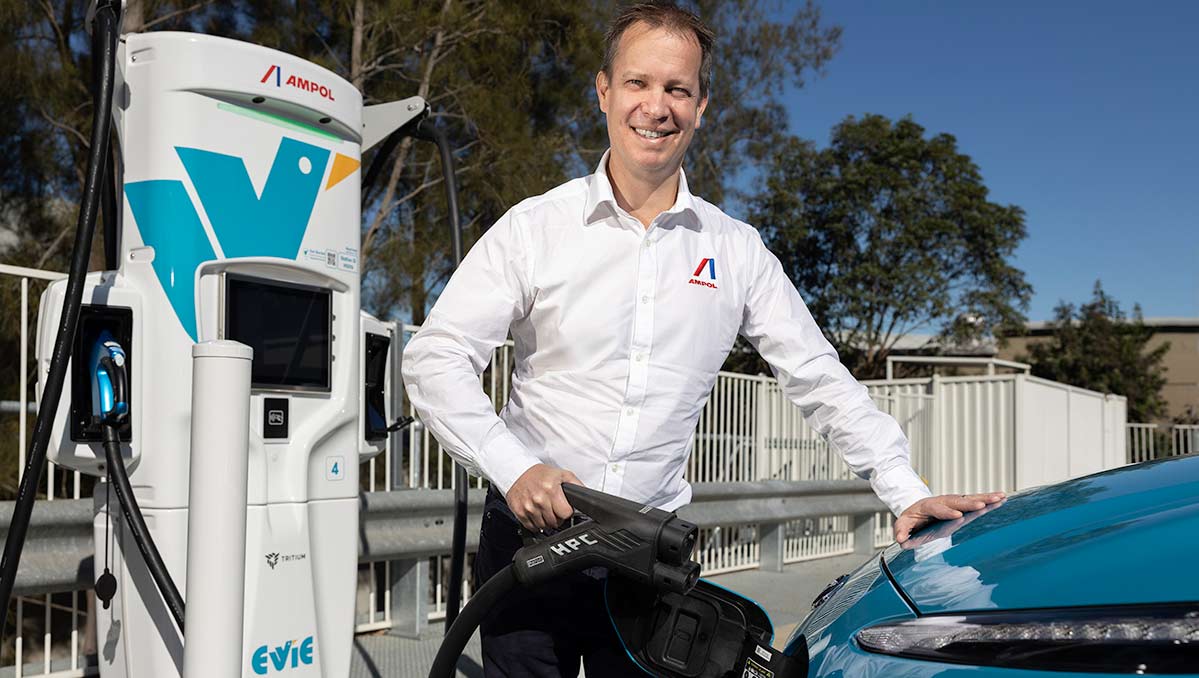Petrol refiner and retailer Ampol has revealed further details of its strategy and leadership team, as it follows oil giant Shell and telecoms leader Telstra into the Australian energy retail markets and lays down a challenge to the industry incumbents.
Ampol’s formal application to become an electricity and gas retailer – first flagged in its net zero document early last year – has been released by the Australian Energy Regulator.
The shift to energy retailing highlights the rapid transition across the energy, utility and transport industries, as established oligopolies are challenged by new technologies, new business models and environmental considerations. Everything, it seems, is up in the air.
The Ampol Energy team will be led by James Myatt, who was a co-founder of Mojo Power back in 2012, along with the current head of the Australian Renewable Energy Agency Darren Miller, and is a former chair of the Australian Energy Retailers Association.
The document also reveals that other members of the leadership team have well established credentials in the industry.
The regulatory and compliance division will be headed by Adam Lourey, formerly of Tango, amaysim, TasNetworks and Alinta, while the acting head of retail is Rochelle Shuenker, who also worked at amaysim as well as Click Energy.
Matthew Nimmo, a former head of energy trading at Pacific Hydro, is the head of wholesale markets, while Steve Jackson, a former senior executive with First Solar, is the head of generation and “decarbonisation”.
Amy Goldenberg joins as head of eMobility and will head the team rolling out the network of 120 electric vehicle charging stations. Goldenberg joins from Osprey in the United Kingdom, which is a leading operator of a network of 100% renewable, rapid electric vehicle charging sites.
Other key executives include chief financial controller Amanda Descoeudres, ex Origin, Contact, Alinta, Sun Retail and PWC, commercial analyst Soeng Te, ex AGL and Alinta, and head of energy operations Carlos Hernandez, ex Simply Energy and amaysim. They will be joined a group of executives from Ampol’s own “Future Energy” team.
The full details and financial forecasts for Ampol’s new energy venture are being kept confidential, but Ampol is keen to tap into its 3 million petrol customers and its 80,000 corporate customers to establish the basis of its energy retail offering.
The company has received ARENA funding to roll out 120 EV chargers at its service stations around the country, backed up by solar and batteries, and exactly how that evolves as the fleet shifts to electric remains to be seen.
Being an energy retailer clearly is important, because it wants to be able to be a provider of power to homes and businesses, and not just to its network of fast-chargers.
“Energy markets and consumer preferences will continue to converge, so as such, the structure of the business is aligned to our future view of the market,” Ampol says in the document.
“Supplying energy to household and business consumers is a key pillar of our future business direction.”
Ampol says it intends to operate in all states in the National Electricity Market – Queensland, NSW, Victoria, South Australia and Tasmania, and will target the residential, small-medium businesses and the commercial and industrial market.
There is general agreement that the future of energy retailing will involve a mix of renewable energy supply, storage, EV charging capabilities and demand management. Companies with huge customer bases, such as Telstra, are looking at how they can tap into those markets to make new offerings.
For a company like Ampol, it will be as much about embracing the future as managing and mitigating against the impacts of the transition to their existing business model, which is entirely focused on selling fossil fuels.
“To effect real change, we know that consumers need to be engaged in the energy transition,” it says. “By becoming an energy retailer, Ampol will be able to bring new customer propositions to market off the back of its generation and mobility investments.”
Of particular interest will be the nature of its generation play, given it will be required to service its customer base, and will need to be focused on renewable energy supplies.
But Ampol’s budget, encompassing all its Future Energy policies, including biofuels, EV charging and its retail operations, so far extends to $100 million out to 2024, or 2025. Clearly, if it is to establish a major presence in energy retailing, and either generate or contract its own electricity supplies, it will need more money.
Ampol Energy says it will manage its retail operations functionality internally and will look to use a “hybrid model” of onshore and offshore customer service support to support its customer base, with any offshore support managed by Ampol Energy.
Ampol received a massive bailout from the federal government last year to protect the future of its oil refinery in Queensland, while it has also announced various projects such as a virtual power plant with Tesla and a green hydrogen facility at Lytton.
See also this analysis: Don’t bet on Ampol pulling off a zero carbon switch
RenewEconomy is seeking your feedback. Our websites and daily newsletters are proudly free to access for all readers and subscribers. But what sort of added features, data and specialist editorial content would you be willing to pay for? Please complete this three-minute readership survey to help us weigh our options. Thank you!










